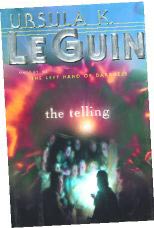THE FIRST MISTAKE in reading any book-length work of fiction by Jeanette Winterson is to expect it to act like a novel. Winterson writes postmodern tales that can’t stop talking about themselves, stories studded with cherry bombs. Narrative? Character? Plot? Winterson delights in exploding these and other, as she would say, 19th-century devices of that obsolete art form, the novel.
The PowerBook
by Jeanette Winterson (Knopf, $24)
The second is to hope for consistency. Winterson is a puzzle. Her writing, which at best is lean and vivid and lyrical, sometimes collapses into bafflingly awful, postmodern purple prose. Winterson’s talent is genuine, but not tidy; I think she likes to make messes. Yet her worse writing has a deliberate quality that suggests an evil pleasure in the pain she’s causing. It’s perverse—and not in a good way.
“Trust me,” she writes in The Passion (Knopf, 1987), “I’m telling you stories.” At her best, she tells stories like no one else. A working-class British lesbian with an Oxford education, an experimentalist who emulates Virginia Woolf (but reminds me more of D.H. Lawrence), Winterson could, if she chose, be one of the leading contenders to write the Great Lesbian Novel.
Her first book, Oranges Are Not the Only Fruit (Pandora Press, 1985), is a loosely autobiographical coming-of-age novel about a teenage evangelist who flees God’s repressive flock and finds—briefly—a girlfriend. Since then, she has continued to pursue the question: Can a woman be the hero of her own story?—i.e., Can a woman get the girl?
She’s also fascinated with questions about time and space, universe and self, lover and beloved, word and act. Alchemy, string theory, and other arcana fill her books. Her esoteric interests have lost some readers—the bitchy British press likes to say that, after Oranges, she’s written only lemons—but thrilled many others who find her work sexy, literate, and imaginative.
But trust is yet to come, at least for this reader. In her new novel, The PowerBook, I find both the best and the worst of Winterson. Should I recommend it for its enticing premise, often lovely writing, and the way it weaves reflections on time, death, art, and eros into a multilayered narrative—the kind of original story Winterson does so well?
Or should I hurl it at a wall because parts of it—the badly written parts—hurt me?
I’ll begin with The PowerBook‘s pleasures. “I want to start with a tulip,” writes Ali/Alix, a narrator of ambiguous gender (a type familiar to Winterson fans). S/he writes stories for clients who want to escape from their lives for a night into a custom-scripted fantasy.
One story takes us to 16th-century Turkey, where a girl disguised as a boy is transformed by a tulip. Others take place in Paris, Capri, and a strange family life in a garbage dump. Ali/Alix corresponds with a client by e-mail, and her storytelling has the erotic charge of a hot e-flirtation.
WINTERSON HAS done all of this before—the flirting, the meditations on theoretical physics and metaphysics interspersed with brief passages of story and parable and historical anecdote. It is still a lovely formula, and she’s in good form here. The organizing conceit of the book—the book itself is an Apple PowerBook, with chapters titled “Open Hard Drive,” “New File,” and so forth—doesn’t really add anything, but it’s easy to ignore.
Now, the pain. As she did in Gut Symmetries (1997), Winterson abandons this gorgeous setup midway for yet another retelling of the androgyne-loves-married-woman love triangle she told best in Written on the Body (1992). This time, the married woman has barely two dimensions, and her husband is a stick figure. The androgyne/narrator spouts a lot of sloppy verbiage: “There are no guarantees. I just have to risk it.” “What does a person need in this life except a roof, food, work and love?”
Here is where Winterson loses her way and starts preaching. The less her narrator seems to know about love, the more pronouncements she makes. By the end of the book, I felt bludgeoned by page after page of declaration.
If I were her editor, I’d tell her that this love triangle, which mirrors widely known events in her personal life, seems to have become a creative dead end for her. And I’d beg her to finish one of these fabulous stories she keeps starting to write. Go back to the tulip, I’d say, and take it from there.
Read Powergirl, an interview with Jeanette Winterson.







